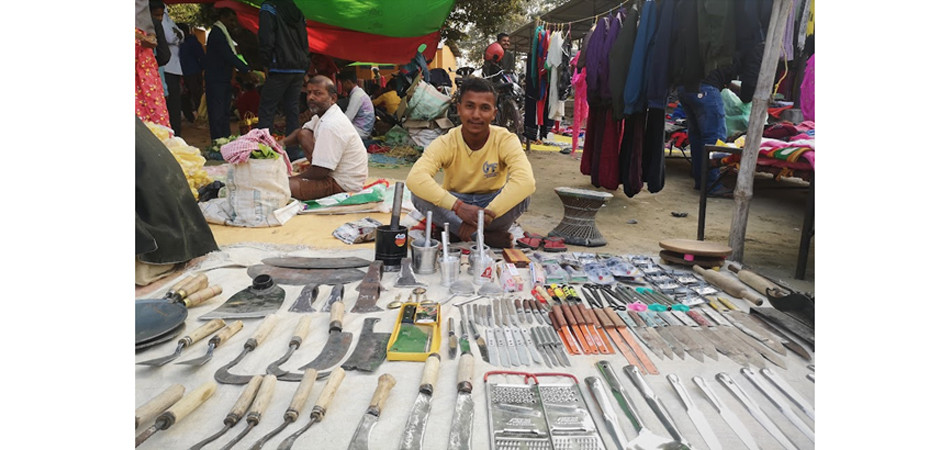
Feb 19 2026 | २०८२, फाल्गुण ७ गते
The quality of your childhood affects the quality of the rest of your life. When childhood is lost, many opportunities are lost with it.
मंगलवार , मंसिर २०, २०७९

For me, childhood was running around the woods with a stick sword, playing unicorn and dragon with my friends after school, and swarming around my parents as they worked in the potato field or around the house. It was a state completely free from responsibility and economic worries, a state of slowly growing and learning. But many people’s childhoods are not like that. They don’t get to play with sticks after school. Many do not even get to go to school, because they are the ones working in the field or at home. They lose their childhood to child labor.
One of these people is Narad Lohar. I met Narad at an ABC Nepal Network Group meeting - an organization that works against human trafficking and women’s right. He was a very energetic and happy boy 20 years of age - the same age as me. But unlike mine, his childhood was very difficult. At the age of twelve,Narad lost his father - the family's only provider. This resulted in him having to take over his father’s business, which was making and selling knives. When I was playing wordlessly with my cat, he had become the only provider of a family of seven. Luckily, he had learnedabout his father’s handicrafts at an early age and was able to continue his education while running the business. “I would wake up early before I went to school to forge the knives, and stay home from school two days a week to sell the knives at the market '' Narad explains. When his two sisters married he took up a loan to pay for their dowrymoney. He is still working hard to repay the debt of 17 000 rupees a month.

Narad with his knives at the local market. He forges the knives and the pans himself. Lately, he has also expanded his shop by selling pre-made goods, like rat traps and other kitchen utensils.
Things got a bit easier when he joined a SAMVAD group, organized by ABC Nepal and Support by Stromme Foundation. The SAMVAD groups exist to strengthen the local communities, boost the confidence of youth, and make them fight for their rights. “I joined the SAMVAD group to learn new things,” Narad explained. “I learned how to develop myself and engage with my local society”. He also got a gift of 20 000 rupees from the organization to better his income by marketing the knives. This opened new doors for him. “I was able to join the local market instead of selling by demand, which increased my income,” he says smiling. He, therefore, got a regular source of income and was able to go to school more often. But the effects of his childhood being disrupted by labor still haunts him today.
According to the ILO, child labor refers to any work that deprives children of their childhood, right to education, health, safety, and mental development. Narad was luckily able to complete his education while working. His strength and optimism make him able to make the best out of every situation. But he was still deprived of his childhood. “The responsibilities I had to take, had both mental and physical effects on me” he admits. He would get body pain from the hard labor and decreased ear and eyefunction due to the forging. He also had to worry a lot about his debt at a very young age. Worries that no child should have. The work made it difficult for him to give proper time to his studies. The marks he got were good, but Narad feels he could have done better. He could have gotten more opportunities. Narad would like to go to university and get a job in a bank, but he cannot because of the loan he needs to repay and the family he needs to provide for.
There is much-lost potential in the story of Narad’s childhood. And there is much-lost potential in the stories of the 1.1 million other children who are engaged in child labor in Nepal. Most of them do not even get to complete their education. If these people were able to be children when they were children, were able to go to school, and focus on their schoolwork, they would more likely have been able to get better jobs when their time for working finally came. They would have been able to provide for their families better, pay higher taxes, and utilize their potential better. It would benefit all of society by making sure children can just be children. But most importantly it would benefit the children, who after all are meant to be just that - children.
The Author:
Name: Klara Svalheim
Country: Norway
Birth: 05.10.03 (19 years old)
Phone: +977 980-8054512
Lives: Sarawal, Lumbini.
Occupation: Volunteer with the organization Stromme Foundation, cooperating with ABC Nepal. Have stayed in Nepal for two months, and will stay for 6 months in total. Came to Nepal mainly to learn about the culture and society.
© 2026 All right reserved to khabarpatro.com | Site By : sobij
